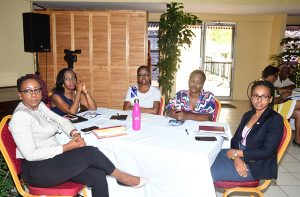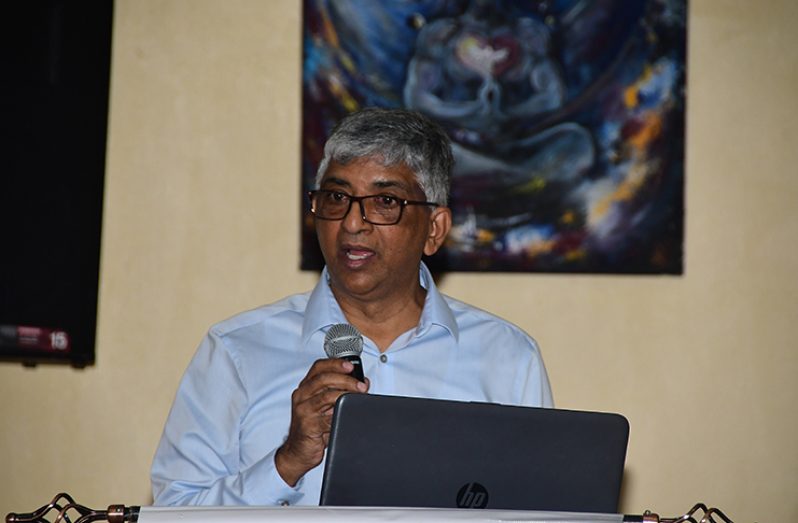…as vehicle for knowledge and skills transfer
Dr. Wazir Mohamed, one of the co-chairs of the 2020 Diaspora Engagement Conference is of the view that there is no shortage of skills and capability in Guyana and abroad. He, however, sees the need for there to be an inter-link, so as to effect the synergies that are needed.
He made the observation on Friday last, February 28, during precursor discussion held at the Education Lecture Theatre (ELT) of the University of Guyana (UG) and aimed at building collaboration for the arrangements of the university’s second Diaspora Engagement Conference.
According to Dr. Mohamed, a team consisting of diaspora members and personnel from UG are actively developing the platform that would involve Guyanese civil society, the private sector, youth groups, Indigenous groups and other individuals in Guyana.
The event is meant to encourage a business competition for local start – as an encouragement for them to engage with a view to showcasing themselves.
“I firmly believe that we should develop a more engaged process that matches Guyanese skills, experiences and expertise with those of the diaspora. We need a groundwork process both at home and abroad, to engage institutions and processes with a view of what we can create and to spur a kind of groundwork development and engagement, in which Guyanese at home and abroad will engage with each other,” Dr. Mohamed reiterated.
He said too, UG is interested in diaspora engagement in relations, part of which has to do with our own interest in how to grow the university and bring the kinds of intellectual resources that we need to have now, back to the country. He noted that those have been fleeing and leaving the country in droves for the last 30 and 40 years.

Noting that re-engagement of the intellectual resources needs to be done in a systematic way, Dr. Mohamed cautioned that the diaspora conference cannot be taken or discussed in isolation from the ongoing discussion regarding the establishment of the diaspora centre at the University of Guyana, as they go in tandem.
Since the 2017 conference, Dr. Mohamed said he has worked extensively and collaboratively and have led discussion to widen and attract support for the idea for the establishing of a diaspora centre. Those collaborations included discussion on action and consultation with CARIFORUM in an effort to the place the diaspora engagement on the agenda of the ACP (African, Caribbean and Pacific) group of countries.
It included too, conducting of a feasibility study by a consultant who was selected through a competitive bidding process by an ACP/European Union combination. The consultant, having interviewed several persons from the diaspora, submitted a report to the EU and the ACP and subsequently the University of Guyana, Dr. Mohamed informed the audience.
The report recommended in no uncertain terms the need for the EU and the ACP to support a centre for diaspora engagement at the University of Guyana.
On this note, Dr. Mohamed disclosed that the governing council of the ACP is now engaged in the process of determining the next step, adding that the consultant’s report were among agenda items at the two highest forums of the ACP- the Political Affairs Committee and Committee of Ambassadors – in January and February this year.
Having already impacted the thinking at the ACP level to the extent that they are prepared to assist to develop the centre, Dr. Mohamed said the university “must be prepared to further all the engagements with a new dispensation of the ACP.” The diaspora centre can be the vehicle to skills and technology transfer that is so vital to development, he charged.
Meanwhile, with effect from March 01, 2020, the ACP has a new Secretary General who is Ambassador Extraordinary and Plenipotentiary of the Republic of Angola to the Kingdom of Belgium, the Grand Duchy of Luxembourg, and Head of Mission to the European Union, Georges Rebelo Pinto Chikoti.
The out-going ACP Secretary General, Guyanese Dr. Patrick Ignatius Gomes, ended his five-year mandate, which began in 2015, on February 29, 2020.
Of the impending diaspora conference, he emphasised that essentially the intention is not to create a talk shop or a think-tank, but to create the institutional framework that will bring Guyanese skills at home and abroad into contact with each other. The aim is for us to learn and benefit from each other, a process that the United Nations likened as a brain gain, he added.



.jpg)









